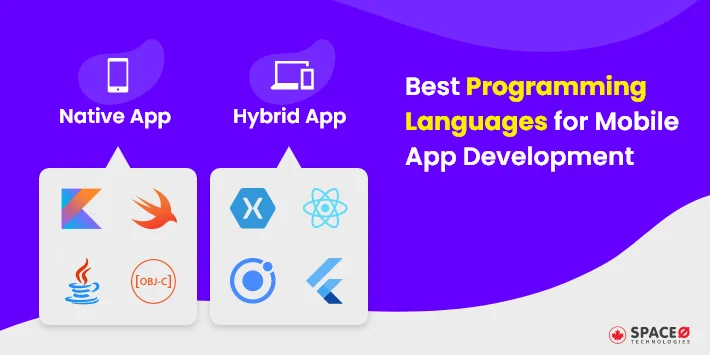Top Programming Languages for Android App Development

The foundation of digital innovation in the present mobile-driven world is Android app development services. From direct utilities to complex business solutions, Android apps appeal to a wide global audience. The languages and tools empower developers to be innovative in change alongside technology itself.
This guide looks at the top programming languages driving Android app development, giving experiences into their benefits and drawbacks for various types of applications, with the goal that businesses can use sound judgment to productively fulfill their app development requirements.
Top Programming Languages for Android App Development
For developers to create solid, viable applications that stand out in an undeniably competitive app market, choosing the appropriate programming language is fundamental. So, let’s know some of the top programming languages you can choose for Android app development. Apart from that you can hire Android app developers for Android app solutions.
Java: The Traditional Powerhouse
For quite a while, Android app development involved Java as its essential language. With its huge libraries, scalability, and dependability, Java makes development more straightforward. It ensures steady execution with extraordinary similarity across a scope of Android devices.
Complex applications require modular programming, which Java’s article-situated approach makes it simpler to oversee colossal codebases. Java’s community backing and solidity are justifications for why almost every Android app development company uses it.
Kotlin: The Modern Alternative
Since Google started offering official help for Kotlin in 2017, the programming language has seen a meteoric ascent in prominence among Android developers. Because of its consistent interoperability with Java, developers can use pre-existing structures and libraries with no hassle.
Through the elimination of common sources of runtime blunders, the invalid safety features of Kotlin contribute to the enhancement of app stability. The cutting-edge linguistic structure and strong inference it offers to settle on is a well-known decision among developers hoping to increase their productivity and work on the clarity of their code.
C++: For High-Performance Apps
C++ is one of the best and most widely used Android app development languages, particularly for performance-critical undertakings such as gaming or real-time simulations. C++, notable for its speed and efficiency, enables developers to upgrade code for operations requiring a ton of resources.
The capability of directly accessing system-level functionalities empowers it to apply a more noteworthy degree of control over the resources of the hardware. For applications that require local code support and high computational performance, C++ continues to be a key programming language, even though it is utilized less habitually for standard Android applications because of its complexity.
Python: For Rapid Prototyping
Python’s usability and adaptability make it an invaluable tool for the development of Android applications, especially for undertakings including quick prototyping and scripting applications. Python’s systems, for example, Kivy and BeeWare, empower cross-platform app development, including Android, despite the way that Android isn’t customarily connected with Python.
Ideals for developers need to rapidly coordinate machine learning models into Android applications or make proof-of-idea applications. In the previous year, Python experienced remarkable growth which is approximately 50%. Constantly, in 2024, it is anticipated that Python’s ranking will increase by an additional 50%.
Flutter and Dart: For Cross-Platform Development
For the development of cross-platform applications, including Android, Flutter, which is fueled by the Dart programming language, has acquired the consideration of developers. Developed by Google, Flutter empowers developers to make encounters that are like native ones utilizing a single codebase. The speedy performance of Dart on Android devices is guaranteed by the way that it incorporates native ARM code early.
It is one of the popular Android app development languages that comes up with the hot reload feature that speeds up the development cycle by empowering real-time code changes, which thus increments productivity. Because extensive documentation and an extensive collection of widgets can be tweaked, it is an appealing choice for both enterprise-level organizations and startups.
Swift: Native iOS and Android Development
Swift, a programming language created by Apple, has gathered consideration for its flexibility past the domain of iOS development. Developers can use the modern syntax and safety features of Swift for the development of Android applications using projects such as Swift for TensorFlow and Swift on Server.
Swift’s interoperability with Objective-C and its growing community support make it a practical choice for developers who know about Apple’s ecosystem and are looking for cross-platform capabilities. Although Swift is more uncommon than Kotlin or Java for Android, it is as yet compatible with both of those Android app development languages.
Go (Golang): Efficiency and Concurrency
On the Android app development front, Go, which is notable for its efficiency and support for concurrency, is gaining traction. Because of its clear syntax and built-in concurrency mechanisms, multithreading is easier, which, in turn, improves the performance of applications on Android devices.
By ideals of its compiled nature, Go’s code is destined to be solid, while its static typing guarantees that it is executed quickly. Go’s capacity to deal with concurrent operations efficiently makes it appropriate for scalable backend services and performance-critical Android applications, even though it is less commonly associated with mobile development.
JavaScript and TypeScript: For Web-Based Apps
JavaScript, in conjunction with TypeScript, gives structures such as React Native and NativeScript to apply web technologies to the development of Android applications. An Android app development company can create Android native apps utilizing JavaScript and React using React Native, which is upheld by Facebook. The fast development and maintainability of the system are made conceivable by its component-based architecture and reusable code.
Static typing is added to JavaScript by TypeScript, which further develops developer productivity and code quality. The utilization of these structures permits developers who are, as of now, gifted in web development to consistently stretch out their capabilities to the development of Android applications.
Conclusion
Project complexity, requirements, or developer commonality doesn’t restrict Android app development. Although Java’s development and ecosystem are well known, Kotlin’s modern features and productivity are beneficial. C++ is better for performance-critical applications even though Python permits quick prototyping and advanced features.
Android app development company utilize JavaScript and TypeScript. Flutter and Dart empower cross-platform development with native performance. These top programming languages permit developers to create apps that appeal to worldwide clients, bringing about digital transformation and app growth.



